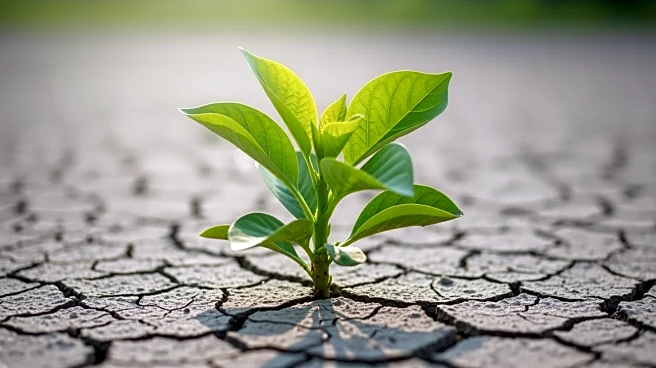What's Happening?
A recent study published in Nature explores the role of hope as a crucial enabler of climate change adaptation. The research suggests that hope can significantly influence the ability of individuals and
communities to adapt to climate change impacts. The study introduces the Model of Hope as an Enabler of Climate Change Adaptation (MHECCA), which posits that hope can foster collective adaptation efforts and, conversely, adaptation can enhance hope. The model is based on existing evidence from climate change adaptation studies, affective science, environmental psychology, and social psychology. It highlights the importance of personal, group, and environmental factors in shaping hope and adaptation behaviors. The study emphasizes that despairing narratives can negatively impact mental health and adaptation investment, while hopeful framings can improve local well-being and investor confidence.
Why It's Important?
The study's findings underscore the potential of hope to drive effective climate change adaptation strategies. By fostering a positive outlook, hope can motivate individuals and communities to take proactive measures against climate impacts. This is particularly significant for vulnerable populations who face severe climate risks. The research suggests that hopeful narratives can enhance adaptive capacity and attract investment, which is crucial for regions like Tuvalu that are highly susceptible to climate change. The study also highlights the role of media, government, and NGOs in shaping perceptions of climate risk, suggesting that they can play a pivotal role in fostering hope and facilitating adaptation.
What's Next?
The study calls for further empirical testing of the MHECCA model to validate its hypotheses and explore the mechanisms through which hope influences adaptation. It suggests that interventions aimed at increasing hope could have positive effects on adaptation efforts. The research also points to the need for more studies on the interplay between hope and other emotions in driving collective climate action. As the climate crisis intensifies, understanding the psychological and social factors that enable adaptation will be crucial for developing effective policies and strategies.
Beyond the Headlines
The study opens up discussions on the ethical and cultural dimensions of climate change adaptation. It highlights the importance of addressing structural barriers such as poverty and marginalization, which can hinder hope and adaptation efforts. The research also suggests that fostering hope could lead to long-term shifts in how communities perceive and respond to climate risks, potentially transforming adaptation strategies globally.











